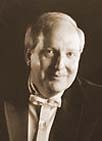
Final provost candidate visits
Robert Blocker, the fourth and final provost candidate, met and talked with student senators and faculty members Friday afternoon to outline his candidacy. As the current Dean of Music at Yale University, Blocker introduced himself to students, and later faculty members, as a man full of experience and no stranger to life in Texas.
“This is an opportunity for me to be involved in a broader prospective and come back to my Texas roots,” he said.
One theme throughout Blocker’s presentations was his sense of what makes a great university great.
“I find it disconcerting when institutions try to define themselves in the eyes of others,” Blocker said. “Those that distinguish themselves do not compete, but find who they are and what they do best. There is one Yale and there doesn’t need to be another one.”
In keeping with his theme, Blocker assessed three areas at SMU in need of improvement: GEC requirements, honors courses and the library.
He stressed the importance of students to experience some type of transformative performance, one that changes them, so they are never the same.
“Great undergraduate departments connect learning and research,” Blocker said.
In addition, a distinguished honors program needs to be developed, one that brings prestige to the program by creating a stronger community among honor students and offering more diverse classes for those students, he said.
At the faculty meeting, Blocker addressed the library in more detail along with faculty tenure and budgeting.
He emphasized the importance of having a distinguished library, commenting on the potentials a presidential library could bring to SMU.
The presidential library would increase recruitment, funding and draw positive attention to the university. He later mentioned the best ways to prepare for the many risks involved in obtaining such a gift.
But not before alluding to one familiar “gift giving incident” of SMU’s past, which at that time created a large fall out, damaging the university’s reputation.
“This is where prior interaction and planning become essential,” Blocker said.
Drawing from his childhood, Blocker named the library as a place of eminent resource for students, stating it as a place all universities should develop to its potential.
“I don’t think an institution can carry on without it,” he said.
On his next point, Blocker outlined how to support faculty and “engage in a rigorous, yet caring tenure.”
There must be a balance for faculty, he said, in order to hire the most qualified people and pay them the best. If there is not a balance, students become reliant on teaching assistants and this “devalues education,” Blocker said.
“You have to make the numbers meet so students aren’t cut short of their education and faculty members aren’t overworked and underpaid,” he said.
Faculty then asked Blocker for his hypothetical response regarding who should have the power to budget for educational purposes.
“I believe if the provost is head of education on campus, he/she should be given the budget to allocate it throughout the university,” Blocker said.
When asked, he provided an off-hand solution for raising graduate students’ stipends. A committee should be created to look for packaging that meets needs, he said. He then stressed the importance and effectiveness of faculty presenting program ideas to donors, basing his answer of past experiences.
Blocker finished his undergraduate studies at Furman University and earned his graduate degrees the University of North Texas. He was a fellow at the Institute for Educational Management at Harvard in 1986 and a recipient of three honorary degrees.
Now that the provost candidates have concluded their visits, provost search committee chair Hal Williams expects the committee to reach a recommendation for President Turner tonight. Williams has been collecting and organizing feedback about each candidate’s visit to the university via phone calls, e-mails, questionnaires and other forms of communication. He will present the feedback before the committee tonight during its discussion of each candidate. The committee is looking for a candidate with the following three qualities as the committee chair stated:
“We are looking for the best person who can work with President Turner and the Board of Trustees to take this university to the next level; who can bring together faculty, students and administrators to create a vision for the institution and to fulfill it; and who will bring everyone into a conversation about what we are and what we can be.”
The committee’s recommendation to President Turner will not be disclosed to the public. When President Turner reaches a decision the public will be notified, which could take several weeks.









